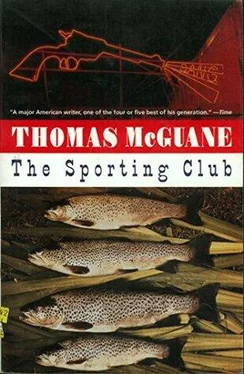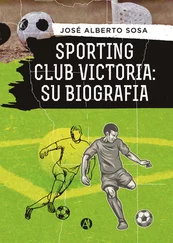He sat down upstairs and lit a cigarette. He looked around the empty living room and gnawed at his lip. An instant later, Earl Olive crashed the door open as he went out, making a strained, humming noise that broke as soon as he was invisible in the darkness to a harsh reiterated howl of animal rage. Quinn sat straight upright; even his nervousness was gone; everything but his attention was gone, until the howling stopped. When that happened, his composure left him and he started gnawing the lip again.
Stanton came up. He looked into the darkness where Olive had gone. “I hardly know what to say,” he said, his tongue lingering on the consonants as though he was about to stutter. “The scene seems to have had its origins in the epics of the Wild West. I never, never imagined … That nice bait purveyor and likable peasant. But no, shooting at me and hunting me is not to be allowed. M-my position here is well, essen tially that of the nobleman.” Quinn groaned. Stanton went on, averting his face. “In any event, I pay bills here. I do not, repeat, do not collect a salary and will not be patronized or stalked by those who do.” He stopped and reflected. “Let’s look at the good side. Let’s notice how this polarizes things. Olive’s dealings with me and the other members make him the enemy within. May I predict that this is not going to be the usual boring, phlegmatic summer? May I predict that it is going to be a little more … athletic? I have to make this place livable and the old low-key razzmatazz just doesn’t do it. When I arrived I did everything I could to make things interesting. I told jokes. I did imitations. I wore funny hats — I had one with windows, decorated with birds’ nests, road maps, calling cards, menus, watch springs, swamp marigolds, spherical paper wasps’ nests, flounder skeletons, cat bones, little rubber horses, photographs of mine shafts and skyscrapers. A printed pamphlet introducing the spectacle was available on request. No dice. They sat around and picked each other’s noses and read the Wall Street Journal. I even tried to improve club relations with the farmers around here. I still had the Ferrari so I could get to a lot of farms in a day. I would pull up alongside a farmer, introduce myself as a member of the Centennial Club and say, ‘The earth is good, gentlemen. Only the soil prevails.’ Then I would demonstrate eleven thousand revolutions in all five gears just to keep their attention, becoming as a tiny dot upon the green horizon. What more could you ask? A living diplomat. I played Teresa Brewer and Perez Prado records in the dining room. Nothing. I gave away free ball-point pens and trained Olson’s dog to shake hands. I killed a rat. No response. Then I saw that rats and hats and ball-point pens weren’t what it takes to electrify twenty-six thousand acres of forest and make it habitable. What it takes is tension and constant menace. And nothing overt would do. These birds can snuff out anything conventional with their various bribed public officials. My task has been to show them the grace and dignity of self-reliance through dueling so that they will think in terms of settling their own problems intramurally. Next I give them a problem. That’s where Olive comes in and I expect he’ll work out just right. Unless I miss my guess, he’s raging around the forest like a rabid dog right now. That is a role Olson couldn’t have fulfilled. He’s too realistic. Now if they settle Olson’s hash on their own they will have taken the first step in cutting themselves off from the outside, and the first step toward setting up a tiny enclave on the sensible systems of the Middle Ages.”
“Who will be king?” Quinn said.
“Oh, come on. String along.”
“I am. But who will be king.”
“No king. It couldn’t get that far. You can’t run a single acre on the principles of the Middle Ages, much less twenty-six thousand. It would be a step toward destruction. That would suit me. I am sentimentally attached to these lands. And I have learned to be the enemy of the people that inherit them. That is what this club hasn’t figured on—”
“What do you mean, Vernor? Come on, will you. Talk plain.”
“Naw, suh! Dat’s enuff. Ah has spoken.”
* * *
Rather than dote on the latest Stanton pronunciamento, Quinn elected to spend the night fishing. As he prepared his tackle and made coffee for the thermos, he involuntarily thought of Stanton’s insolent dream world and the cockeyed dramas that proceeded from it, commonly embroiling everyone around him.
Quinn headed for the river, not undertaking this fishing lightly. The night was warm and creaky, the round spring moon figured with bats and moths. He anticipated the hunting owls and raccoons rinsing mussels in the shallows; and the green luna moths of the spring fishing. He remembered how the long hours of staring at the mutable silky river often left him dazed for a day after. He wondered if this accounted for the seasonal drownings, fishermen turning up lodged under bridges or in log jams and having to be brought ashore with a boat hook; or those that simply vanished in still backwaters to rotate a couple of days before sinking. Such considerations dallied with his nerves when he was night fishing. Sometimes it only required a momentary loss of balance, the sound of feral dogs running deer or the whistle of the Pere Marquette railroad, and Quinn scrambled out of the river with a galloping case of the creeps to race up the grassy slopes to his house.
Quinn stepped into the dark river, already concentrating and beginning to sort out the sounds around him and to distinguish the musical splash of frogs from the slash of feeding trout and the careless splashy rises of young trout from the heavier, pulling rise of big fish; it all had to be done by ear. The darkness encouraged his dreaming and replaced Stanton’s lunacies with heavy trout that threshed the smooth and moon-yellowed water. So far, there was no hatch of any kind; a few moths barged around and young trout slapped at mosquitoes. Raccoons hunted in the shallows and a black watersnake went by, carried sideways downstream, the head pointing steadily to the far bank while the tail drove. A good brown trout would eat a watersnake.
The river here was a hundred feet wide, fast and channeled along either bank. In the middle, two overlapping currents had built a gravel bar. Quinn was standing on this bar when he heard the blast. And because there is no part of the natural environment more constant than the sonic boom, he thought of that. But then he saw that this was denser and closer. It was dynamite. The silence in the blast’s wake was severe. He waited instinctively. Then the water began to rise quickly around his knees and ahead of him he saw a low, glassy ledge hurtling in the moonlight toward him. An instant later, he was knocked flat under a cold swell of water that tore his rod from his hand and turned him hard against the cold gravel bottom helpless in his waders and off the end of the bar into the deep water of one of the channels where he shot along far beneath the surface, raked by the ends of sunken logs. He struggled with the waders, hauling them down around his knees, then fighting erect toward the surface for air and trying again until the waders were free of his legs and he thrust toward the top. But where the surface was to have been was only more water, black and intervening, and he compulsively filled his lungs and stopped struggling. The current ceased its swelling pressure and he hung a moment in black suspension feeling himself turn in some backwater. Then spasmodically he fought, punching and kicking into the blackness that yielded to him, deferred to him, until he found himself unexpectedly surfaced, then on a low ledge of mud that sank deeply under his hands and knees. He seemed to be reaching into the earth. He knelt sinking and expelled gouts of lung-warmed water in seizures of his chest. He lay down in the foul mud. A thick cloud of mosquitoes rose singing around him and settled again, covering him. He didn’t resist, though he sensed dimly that they covered him and that the singing had stopped. He could feel, too, his lips pull away from his teeth in a grin, and a song repeat sonorously in his head as though sung in a culvert: “Dat ole black magic has me in its spell, dat ole black magic dat I know so well—” It was Stanton’s voice. A few feet from Quinn’s head the river hissed past. But where had that water come from, that whistling, glassy ledge of racing water? There was no flow control here as on the Manistee. He hadn’t the energy to pursue it or to lift his limbs or resist the burning in his lungs. He couldn’t wave away the mosquitoes that buried him.
Читать дальше












